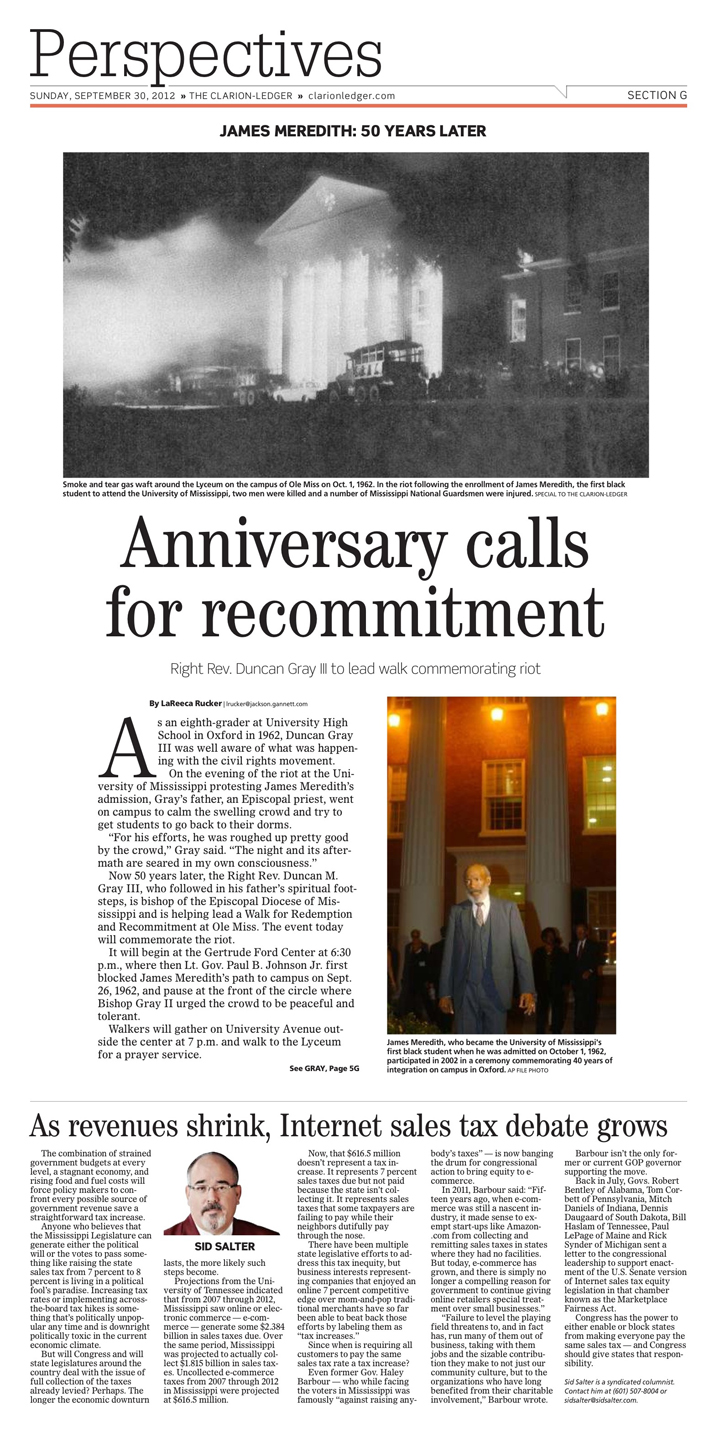Anniversary calls for recommitment: The Right Rev. Duncan Gray III to lead walk commemorating riot
LaReeca Rucker
The Oxford Eagle
As an eighth-grader at University High School in Oxford in 1962, Duncan Gray III was well aware of what was happening with the civil rights movement.
On the evening of the riot at the University of Mississippi protesting James Meredith's admission, Gray's father, an Episcopal priest, went on campus to calm the swelling crowd and try to get students to go back to their dorms.
"For his efforts, he was roughed up pretty good by the crowd," Gray said. "The night and its aftermath are seared in my own consciousness."
Now 50 years later, the Right Rev. Duncan M. Gray III, who followed in his father's spiritual footsteps, is bishop of the Episcopal Diocese of Mississippi and is helping lead a Walk for Redemption and Recommitment at Ole Miss. The event today will commemorate the riot.
It will begin at the Gertrude Ford Center at 6:30 p.m., where then Lt. Gov. Paul B. Johnson Jr. first blocked James Meredith's path to campus on Sept. 26, 1962, and pause at the front of the circle where Bishop Gray II urged the crowd to be peaceful and tolerant.
Walkers will gather on University Avenue outside the center at 7 p.m. and walk to the Lyceum for a prayer service.
Gray also has sent special prayers for racial reconciliation to be used in all Episcopal services today.
Ole Miss Chancellor Dan Jones will speak at St. Peter's Episcopal Church, and other churches have invited special and appropriate guest preachers to mark the day.
The Rev. Joe Tonos, pastor of Oxford's St. John the Evangelist Catholic Church, said Catholic, Methodist and Episcopal churches will offer services to commemorate the occasion.
"Each church then will invite congregants to walk to the Lyceum at dusk in memorial of that Sunday 50 years ago," he said.
Change has occurred in the past 50 years, Tonos said.
"Even though the Meredith 'moment' is important, the social mores and values of our culture have changed," he said.
"Personally, we aren't as 'Southern' as we were in the '60s. Technology, education, communication and other factors have made Mississippians more part of an American mainstream culture. The vestiges of racism and ignorance remain, but they are not dominant."
Mississippians can further racial reconciliation by recognizing the beauty of racial differences, he said.
"The spirit of unity and tolerance that is being displayed is a reflection of the values embraced by all parties involved," Jones said.
"The anniversary enables the university to celebrate Meredith's admission as the beginning of a renaissance that continues today," he said. ". . . Meredith's admission to the university laid the groundwork for many of the great achievements in access and equality that followed. His courage has served as a beacon and a symbol of the university's legacy of leadership."
Over the past decades, Mississippi has made great strides in, not only acknowledging painful parts of its history, but also rectifying social injustices that led up to the civil rights movement, Jones said.
"Racial reconciliation will result from respectful dialogue, like that fostered by the William Winter Institute, and through a diverse student body that allows people of many backgrounds and beliefs to understand that we are all more alike than different," he said.
Gray said bishops of the Episcopal, Catholic and United Methodist churches began meeting together regularly in the 1960s to look for ways to address the challenges of that era. They have continued that practice.
"I would hope that this would be another step in the healing process for individuals, the university, the Oxford community and our state," he said. "We, from time to time, need to go back to those places of pain so that God might heal us."
Gray said Ole Miss has taken the tragedy of its past and sought to meet the challenge it presented head on.
"The extraordinary work of the William Winter Institute, for instance, is an example of the way in which the inability to hide from our past has made us more sensitive and creative in our future," he said. "There are many examples of that at Ole Miss."
The solution to race issues?
"Get to know people of different races and cultures," Gray said.
"We Mississippians are people for whom relationships are foundational. We can manage extraordinary differences, disagreements and conflicts in relationships. We just need to focus on our God-given gifts and listen to the stories we have to tell each other."
We also must make peace with our past and own it without excuses, he said.
"There is within the human heart both an incredible capacity for good and an ever real and close temptation for evil," he said. "Often, leadership tips the scales one way or another."


